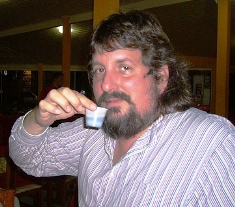| Coffee Spirit James Hayes-Bohanan , Ph.D. Coffee Maven and Geographer Bridgewater State College UPDATED March 21, 2010 |
 |
|
I have
expanded this site's information about coffee shops, coffee roasters,
coffee tours, health effects,
and coffee preparation, and have moved that information to other pages. Please explore! |
|
| In late November 2008, I was one of
several members of my church who were asked to give a brief description
of our spiritual journeys as part of a new, occasional series of such
presentations on Sunday mornings. I did not intend to focus on coffee,
but as the text below reveals, coffee has become integral to my
spiritual life. A
Journey toward Gratitude Presented at First Parish UU
Bridgewater |
 Get the stickers! |
|
Since last Sunday, I have been contemplating how to describe my spiritual journey – where I have come from and where I am now. Perhaps the biggest difference is that I used to talk about my spirituality a lot, and these days I rarely do so. I grew up sharing my testimony as a regular part of worship. These days, spirituality is important to me, but it is not something I put into words very often – or very well. Then a blast from my spiritual past hit me
in the middle of
class on Wednesday. My class was watching a film
about When I heard Montt’s name, I was reminded of
the first time
I heard it, three decades ago. In those days, going to church two or
three
times a week and living on a seminary campus the rest of the time was
not
enough for me: every Saturday night I took a bus to Kansas City Youth
for
Christ – to a weekly rally that attracted thousands of the city’s
evangelical
youth. It was at such a rally – during the heyday of Jerry Falwell –
that I
first heard of Ríos Montt. He had recently become a born-again
Christian and a
darling of the religious right in the On Wednesday I tried to explain this contradiction to my students, but then I found myself struggling with the question of how I had gone from that spiritual place to the place I am now. Evangelical adulation of this monster reveals the ugliest side of a dogmatic religion: those who articulate the same dogma are part of the same tribe, to be defended regardless of how they actually live. For many years now I have recoiled at this tendency, and I must admit that I sometimes flinch at recitations of dogma in my new, more progressive faith, even if I agree with them. This week’s evangelical flashback also
caused me to think
about what, if anything, I still carry with me from my born-again days.
I have opposed
the rigid doctrine for many years now, but I think I have moved beyond
a
wholesale rejection of my former spirituality. What has persisted? The
most
important parts, I think, are a deep concern for the well-being of
others and a
habit of living in a tight-knit community. The concern for others was
once
expressed as an obsession with saving
them from damnation, but I really think this obsession was rooted more
in the
love of others than arrogance about my own rectitude. In charitable
moments, I
try to presume the same of the evangelicals I meet. The second part,
living in
a tight-knit community, was not found in the huge Saturday-night
rallies, but
at a series of small churches and student groups where I was able to
serve and
to grow. That memory is revived every Sunday morning here on Thinking back to Ríos Montt, today I feel much more connected to the victims of his crimes than I ever did to my former co-religionist. How that connection came about is part of the rest of my story, and it starts with a question about a pencil. A decade ago, my friend and academic advisor
convinced me to
use his textbook
in a course on environmental geography. The opening page of
the book asks students to consider the pencil, and the variety of
resources
needed to bring it to the consumer. Over time, I changed the exercise
to ask
about a cup of coffee, and this has changed my life. Both the pencil
and the
coffee are examples of items we take for granted, but which connect us
to
communities and environments half a world away. The question started as
an
academic exercise about the sources of commodities and structures of
trade, but
it has led me to learn as much as I can about the people behind those
connections, and to understand the real meaning of what UUs call the
interdependent web of life. Last summer, it led our family to some of
those Mayan communities that had
been terrorized by Ríos Montt. Today they struggle
to sell their coffee for a fair price, and we were invited to share
what we’ve
been learning from grower cooperatives in My learning about coffee has merged with another aspect of my spirituality that derives from repeated readings of Pirsig’s hippie classic, Zen and the Art of Motorcycle Maintenance. I try to live in the present and to be mindful of quality. From this, we have developed a morning ritual of hand-grinding the coffee beans and carefully brewing a small batch. The process itself is a meditation, connecting purposeful action to quality in the cup. As we savor the coffee, we think about the farmers from which it came, and I swear that the coffee tastes best if it comes from a place where I know the farmers. I thank them not only for the care they put into their product, but also for their willingness to open their homes and communities to me and to my students. They accept us with open arms, even though we come from across enormous divides of privilege, history, and politics. The connections that some of my students have made with the coffee farmers allow them, too, to reflect on the many ways – aside from coffee – that our lives are privileged. It calls many of them to service, and it leads them to share what they have learned with other students, who in turn are changing their lives. Those of us who visit and learn from the farmers gain so much more than we give. Early in this process, I would have described my spiritual life today primarily in terms of connectedness. Now I would describe it primarily as an attitude of gratitude. The more people I meet and the more I learn of my own dependencies on people near and far, the more humbled and grateful I become. |